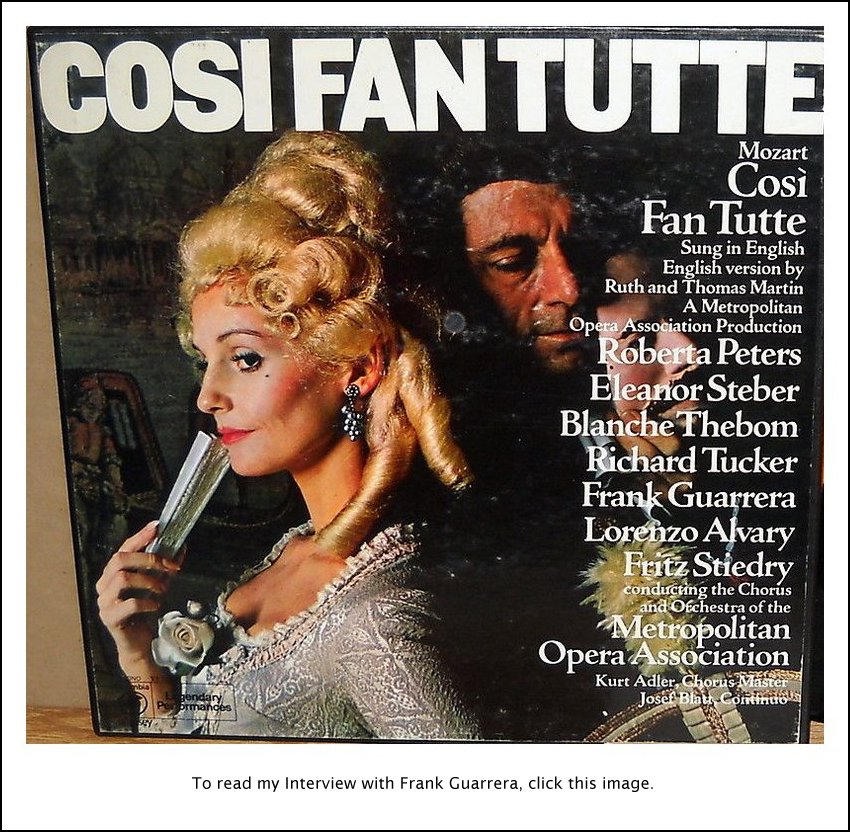Blanche Thebom Interview with Bruce Duffie . . . . . . . . . (original) (raw)
Mezzo-Soprano Blanche Thebom
A Conversation with Bruce Duffie
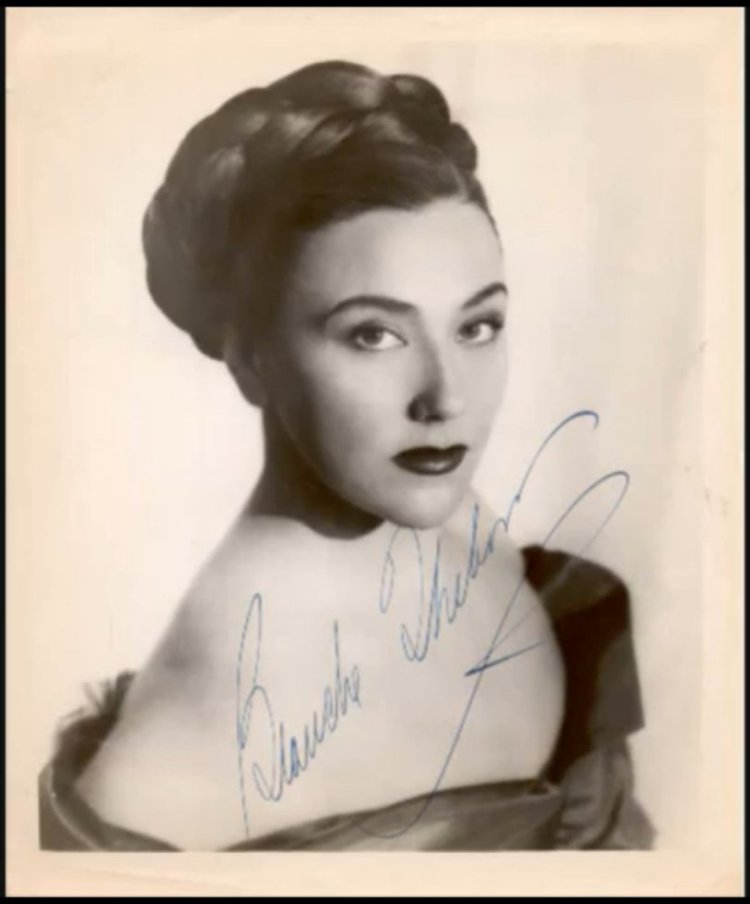
Blanche Thebom: Mezzo-soprano lauded for her interpretations of Wagner
By Elizabeth Forbes
The Independent, 30 April 2010
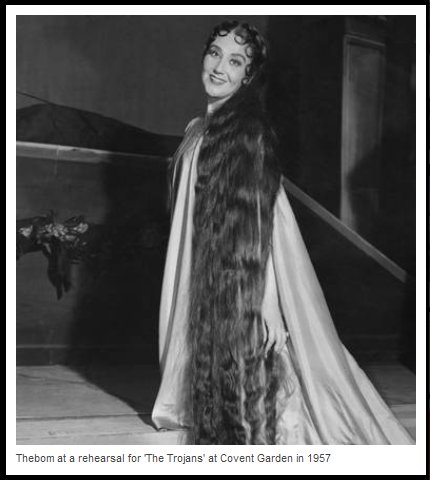 The American mezzo-soprano Blanche Thebom was not only a fine singer with a lovely voice, she was also a very beautiful woman with a superb figure and amazing hair that, when let down, hung well below her knees. Though she sang mostly in the United States, appearing at the Metropolitan, New York, for 22 seasons, as well as in Chicago, San Francisco, Dallas and other cities, she visited Glyndebourne in 1950 for an enchanting Dorabella in Mozart's Così fan tutte and Covent Garden for Dido in the first professional stage performance in the UK of Berlioz' Les Troyens in 1957. She excelled in the operas of Wagner, but her range was wide and her repertory included roles by Gluck, Handel, Verdi, Richard and Johann Strauss and Stravinsky.
The American mezzo-soprano Blanche Thebom was not only a fine singer with a lovely voice, she was also a very beautiful woman with a superb figure and amazing hair that, when let down, hung well below her knees. Though she sang mostly in the United States, appearing at the Metropolitan, New York, for 22 seasons, as well as in Chicago, San Francisco, Dallas and other cities, she visited Glyndebourne in 1950 for an enchanting Dorabella in Mozart's Così fan tutte and Covent Garden for Dido in the first professional stage performance in the UK of Berlioz' Les Troyens in 1957. She excelled in the operas of Wagner, but her range was wide and her repertory included roles by Gluck, Handel, Verdi, Richard and Johann Strauss and Stravinsky.
Thebom was born in Monessen, Pennsylvania, in 1918. She studied in New York with Margaret Matzanauer and Edyth Walker, both famous singers in their day. She made her operatic debut in Philadelphia with the Metropolitan Opera Company as Brangäne in Tristan und Isolde on 28 November 1944 and repeated the role in New York on 14 December the same year.
During her first season she also sang Fricka in both Das Rheingold and Die Walküre as well as Waltraute in Götterdämmerung. Her other Wagner roles at the Metropolitan included Venus in Tannhäuser and Ortrud in Lohengrin, but Brangäne remained her favourite; she sang it in Chicago in 1946, in San Francisco in 1947 and on the 1952 recording conducted by Wilhelm Furtwängler in which Kirsten Flagstad sings Isolde.
Meanwhile Thebom enlarged her Metropolitan repertory with Laura in Ponchielli's La gioconda, Giulietta in Offenbach's Les Contes d'Hoffmann, Marina in Mussorgsky's Boris Godunov, Amneris in Verdi's Aïda, the title role of Thomas' Mignon, Delilah in Saint-Saëns' Samson et Dalila, Herodias in Richard Strauss's Salomeand Prince Orlovsky in Johann Strauss's Die Fledermaus. In 1953 she sang Baba the Turk, the Bearded Lady, in the US premiere of Stravinksy's The Rake's Progress, scoring a personal triumph. Having made her San Francisco debut as Laura, she repeated many of her Metropolitan roles there, but also gained some interesting new ones, including Oktavian in Richard Strauss' Der Rosenkavalier, Mother Marie in Poulenc's Dialogues des Carmélites and Orfeo in Gluck's Orfeo ed Euridice.
Her appearance as Dorabella at Glyndebourne in 1950 was a great success. Conducted by Fritz Busch and directed by Carl Ebert with Sena Jurinac as Fiordiligi, it was a particularly enjoyable performance of Così fan tutte in which the American visitor fitted perfectly.
The first professional stage performances of The Trojans (the opera was sung in English) were even more memorable. Conducted by Rafael Kubelik, then music director of the Royal Opera and directed by John Gielgud, withJon Vickersas Aeneas opposite Thebom's Dido, the production aroused enormous interest in operatic circles.
The eight performances, opening on 6 June 1957, were all sold out, with people coming from all over Europe and even further afield. Thebom sang the love music most beautifully, and if she could not quite express the outrage of the abandoned queen after the departure of Aeneas, she looked magnificent in her death scene at the end, the famous hair falling like a curtain around her. There were five more performances ofThe Trojans at Covent Garden in the autumn 1958.
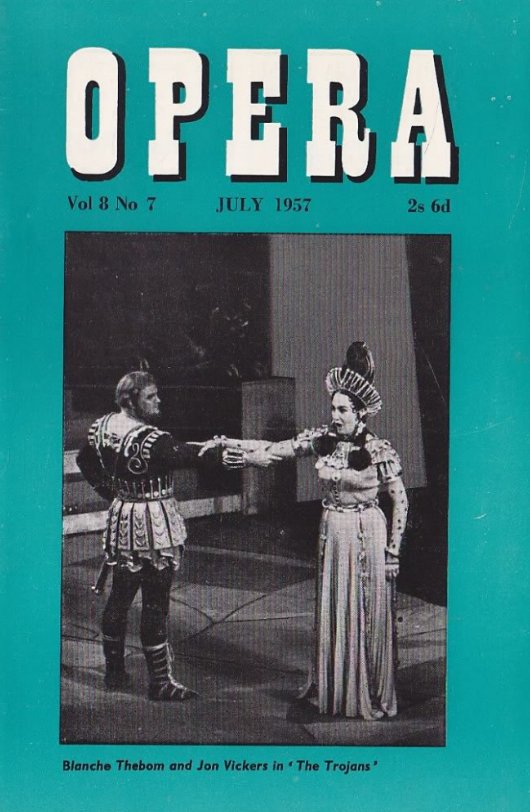
Thebom continued singing at the Metropolitan until the 1966-67 season, then became general manager of the short-lived Atlanta Opera Company in 1968. Later she retired to San Francisco.
Blanche Thebom, opera singer; born Monressen, Pennsylvania 19 September 1918; married Richard Metz; died San Francisco 23 March 2010.
-- Note: Names on this webpage which are links refer to my Interviews elsewhere on this website. BD
In October of 1982, Blanche Thebom was in Chicago — along with Placido Domingo and Italo Tajo— to judge the Regional Auditions for the Metropolitan Opera National Council. The following day, she graciously took time to speak with me at the apartment where she was staying. Here is that conversation . . . .
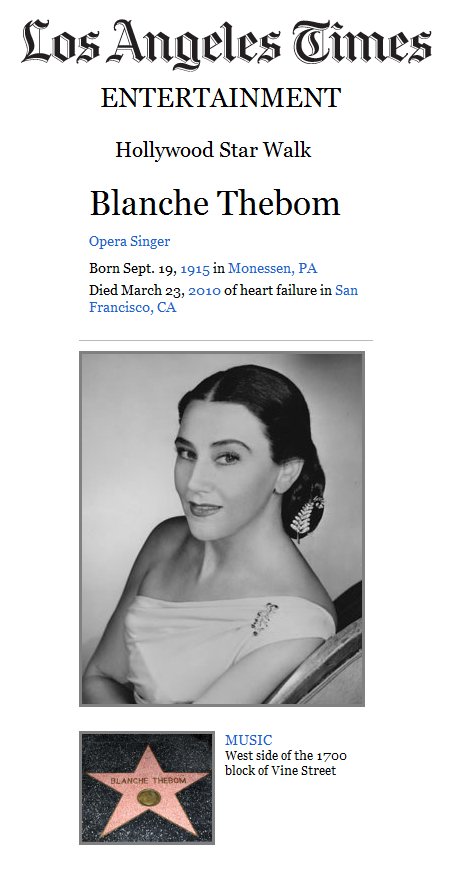 Bruce Duffie: Let's start out by talking a little bit about Wagner.
Bruce Duffie: Let's start out by talking a little bit about Wagner.
Blanche Thebom: That's a good way to begin because that's the way I began!
BD: How is Wagner approached and performed differently today than when you were studying?
BT: I was extremely fortunate to have worked with people who had a great deal of vision — Margaret Matzenauer, Edyth Walker, and I did my dramatic training with Lothar Wallerstein who was the stage director at Vienna Staatsoper. They all had to work within the scale of existing productions. Then I worked with a magnificent German coach named Paul Meyer. He spoke many languages and was extremely competent and was very sensitive to the more contemporary influences. Edyth Walker was, as she told me, a renegade and firebrand because she was much younger than those who were singing leading roles in her day, and that was pretty much the case with me, too. I made my Met debut with Helen Traubel, Herbert Janssen, and Lauritz Melchior, so I had a tremendous advantage in my debut because I looked like a "babe in arms." I also looked very thin! The others were just mountainous people. But my training, to get back to your original question, was based on traditions because I was fortunate to work with great exponents of their art. They all demanded that I do a tremendous amount of reading and research on my own. Wallerstein had been a dancer, so the whole suppleness of the body acted as an extension of the actual vocal sound, and the text articulation was drilled into me at a very early age.
BD: So it was a new idea to do more acting on the operatic stage?
BT: Oh indeed it was. Edyth Walker had terrible troubles with Mahler in Vienna because he came as a young conductor and was the von Karajan of his day. He did it all and she, by that time, had been a star for several years. She also rode horseback and was one of the first woman-automobile drivers, so she was a really exciting lady.
BD: Was she a woman's libber?
BT: She probably was. She was a totally independent thinker, which was what she inculcated into me, along with the heritage of my Swedish parents who also did that. But in Vienna, Walker, who had also trained as a concert pianist, found it impossible to stand and face directly front all the time staring at the conductor's stick. She was one of the early actors in opera, so her performances were genuine theatrical presentations. She was famous for that as well as for her incredible technique. She and Mahler had a tremendous row and Mahler had her dismissed from the opera saying he would make it impossible for her to work any place in Europe. It so happened that Conreid was at the time scouting Europe for the Metropolitan Opera Company in New York, and since she was at liberty and an American to boot, he engaged her and she made her debut one week after Caruso [in November, 1903 as Amneris in Aïdawith Caruso]. She stayed three years and then returned to Europe and remained there until she was in her fifties. She then came to New York to teach and I was fortunate to work with her. I checked the papers of the time when she made her debut in New York and she was the one who got rave reviews. Caruso was judged as being young, and not wholly as satisfactory as Jean De Reszke had been. There wasn't enough elegance in his musicianship, and she was the star of the performance. This was despite the fact that she had refused to pay off the claque! [Note: At this point, there was a knock at the door and a momentary interruption of the conversation.]
BD: Let me ask you about distractions while you were performing. Did they disturb your concentration?
BT: No, not at all. Dealing with all the things going on besides the actual performance is one of the facilities that singers have to prepare for so that one strata of activity doesn't disturb the other. The stage director has laid out where you should be at every moment, and there are all the musical requirements and the vocal requirements, and there is the prompter who, for me, was always a terrible obstacale because I never needed him. It was always going on, and was one distraction that I had to make a deliberate effort to get around. I had to block him out. I did many roles with large choral scenes, and the coaches and leaders of the choruses are always around giving cues and beats from behind the proscenium on ladders with white handkerchiefs in their hands. Before Mr. Bing outlawed people in the audience being seated during the performances, we on the stage could see the flashlights going up and down the aisles with latecomers. Plus, next to the prompter's box is another hood for the chief electrician, and there's always someone popping up and down checking this or that lamp and seeing what's going on onstage. It's really like trying to function in the middle of an anthill.
BD: Did you ever feel that your performance was secondary to everything else?
BT: Never!! [Laughing] There is the orchestra in front of you and the conductor always beating time, so there is a physical separation between you and the audience. It's so very different in recital where the audience can be so very close. There it can be a distraction if the audience is not sensitive to it, and it can also be one of the most exciting things to have.
BD: You have more intimacy?
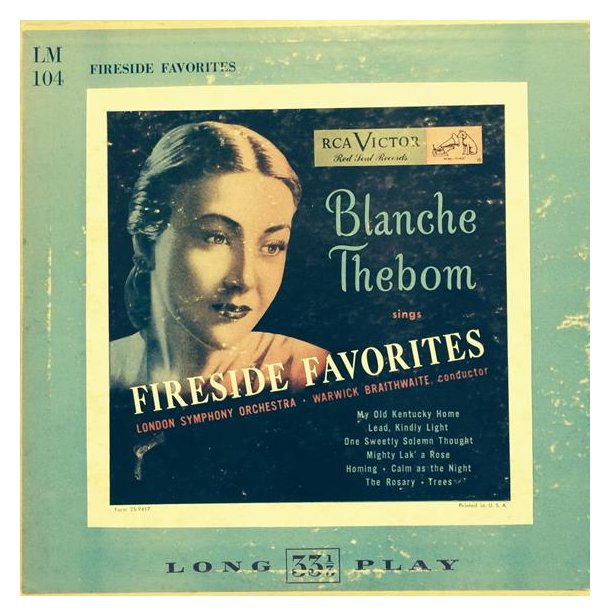 BT: Yes. I did have an important recital in Minneapolis one time. That's a real music-loving town with an astute audience, and I was a young artist and I was eager to do a very good job. Well there was a lady in the front row knitting on a wide scarf. She was watching me and then she'd flip the thing over and continue to knit. It got to the point where I was missing cues! You wonder when she was going to flip next. So at the end of the second group, I sent word out to the manager asking if he would please be good enough to ask this lady to move a few rows back if she wanted to continue to knit. I remember another time during an orchestral rehearsal of Orfeo when Markova was dancing the blessed spirit. Herbert Graf had done themise-en-scène, and it was done with a scrim. Of course we all loathed the scrim, and that makes side lighting imperative unless you are doing a special effect, which was not the case during this particular dance. I wasn't singing in that production, but was in the house because I adored that lady because I had studied dance a bit just for physical control. I never could have been a dancer, but I feel it is an imperative adjunct to an opera singer's training. Not only the body-movement, but the true plastiqueand balance. Otherwise there is no elegance in movement. Just body-movement doesn't do it for me. There isn't enough discipline. So I always took ballet classes and was fascinated with everything Markova did. She was a beautiful artist with incredible timing. She was etherial, not like anything alive up there. But anyway, in this rehearsal she would hesitate occasionally and then pick it up a few steps later, and finally she just stopped. She said she could not dance with the lighting that way. She needed at least one spotlight from the front. She said, "I must have something to dance into." [For more about the point of view of the operatic dancer, see my Interview with Maria Tallchief.] You must have the ambiance for the dancer, and I didn't realize this was important for them, too. It's the whole passage of everything, the whole continuity and the flow of communication. It isn't that you have to focus on something, but whatever place you are performing you have to have awareness of the area into which you are projecting. For us it is character projection, style projection, vocal projection, dramatic projection, everything goes at once. I was sitting with a colleague back then, and we were delighted she had challenged the direction. We thanked her for that. But in my early days, I never had the misfortune to be straight-jacketed by "traditional" stances and so on.BD: Are we going too far today in the staging?
BT: Yes. I did have an important recital in Minneapolis one time. That's a real music-loving town with an astute audience, and I was a young artist and I was eager to do a very good job. Well there was a lady in the front row knitting on a wide scarf. She was watching me and then she'd flip the thing over and continue to knit. It got to the point where I was missing cues! You wonder when she was going to flip next. So at the end of the second group, I sent word out to the manager asking if he would please be good enough to ask this lady to move a few rows back if she wanted to continue to knit. I remember another time during an orchestral rehearsal of Orfeo when Markova was dancing the blessed spirit. Herbert Graf had done themise-en-scène, and it was done with a scrim. Of course we all loathed the scrim, and that makes side lighting imperative unless you are doing a special effect, which was not the case during this particular dance. I wasn't singing in that production, but was in the house because I adored that lady because I had studied dance a bit just for physical control. I never could have been a dancer, but I feel it is an imperative adjunct to an opera singer's training. Not only the body-movement, but the true plastiqueand balance. Otherwise there is no elegance in movement. Just body-movement doesn't do it for me. There isn't enough discipline. So I always took ballet classes and was fascinated with everything Markova did. She was a beautiful artist with incredible timing. She was etherial, not like anything alive up there. But anyway, in this rehearsal she would hesitate occasionally and then pick it up a few steps later, and finally she just stopped. She said she could not dance with the lighting that way. She needed at least one spotlight from the front. She said, "I must have something to dance into." [For more about the point of view of the operatic dancer, see my Interview with Maria Tallchief.] You must have the ambiance for the dancer, and I didn't realize this was important for them, too. It's the whole passage of everything, the whole continuity and the flow of communication. It isn't that you have to focus on something, but whatever place you are performing you have to have awareness of the area into which you are projecting. For us it is character projection, style projection, vocal projection, dramatic projection, everything goes at once. I was sitting with a colleague back then, and we were delighted she had challenged the direction. We thanked her for that. But in my early days, I never had the misfortune to be straight-jacketed by "traditional" stances and so on.BD: Are we going too far today in the staging?
BT: I don't think so, no. It depends on the motivation. If the director is just trying to grab attention with devices that have no ethical basis, then it's gone too far. But if we use contemporary potentials to heighten the effect of a theatrical genius such as Wagner, then I think we would be remiss if we didn't take advantage of every single thing we could do — because he would have. He would not have destroyed the intent of his work with it, but stage directors can get carried away with the mechanical possibilities.
BD: Are we living in the age of the stage-director?
BT: Yes, but we can simply wait for it to kill itself off! [Both laugh]
* * * * *
BD: Tell me about your first appearance in opera.
BT: It was a very peculiar set of circumstances. My very first appearance on any stage was with the Met as Brangäne in Tristan. It was a Tuesday night in Philadelphia, when Ormandy took his orchestra to Washington DC and everyone was playing musical chairs! My New York debut was as the Walküre Fricka, which was a totally different type of character. Very soon I also sang the Brangäne in New York, and because I was not the traditional kind of person in the part, Olin Downes took every opportunity to use his column in the New York Times to instruct me as to how it should be played. He took the attitude that Brangäne was a serving maid, sort of a part-time person who you'd hire to come in and clean. In my research and in my presentation of the role, she was not a paid employee but rather a lady-in-waiting. She was Isolde's friend, confidante, perhaps almost even her equal in stature. It's the only way that it makes sense for her to disobey and mix a different drink, and for her to have the courage to go up and speak as she does to Tristan, and react the way she does to the brutality and uncouth responses of Kurwenal. These responses are of a lady, not of somebody who scrubs the floor.
BD: When Brangäne mixes the drink, does she know what the ramifications are going to be?
BT: I thought not. I thought that her primary concern was to save the life of Isolde, who was the center of her life and who she adored and loved beyond anything. It was not to save Tristan's life but save Isolde's. If one thinks that Brangäne foresaw the ramifications, there would have been no reason for Wagner to leave Brangäne onstage after the drink was consumed. Her feeling that she was going to make Tristan and Isolde be friends and save her mistress. No score I've ever seen had her leave.
BD: Here in Chicago, she sort of collapsed in a heap and was cowering in terror.
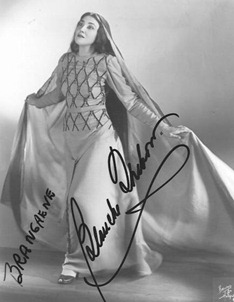 BT: I never did it that way. I played it through a long series of emotional motivations. First is the silence, sort of "Good God, what have I done?" I never looked at them after giving them the drink. I went back to the table with my back toward them. There were no cries of pain which would have been the effect of the poison. The music, though, makes you feel how the drink penetrates every fiber of their beings, so I worked my character into this also with a shuddering kind of apprehension and excitement. That's the dance training. When the music says something, there has to be a physical response as well. Then I went through a series of increased tensions until the first word was sung. Then there was a joy and delight at knowing they were not dead. That's the first real proof that they are still alive. Because my back was toward them, my last vision of them had been their intense antagonism, like two opponents in combat, and when I turned to see them looking with such love, I don't think Brangäne quite understands until they fall in one another's arms, which happens exactly at the first announcement of the arrival of Marke. So it's some marvelous moments for acting. I've seen recent productions where the stage-director has gotten Brangäne off the stage and it indicated to me that he has no concept of what to do with those wonderful passages.
BT: I never did it that way. I played it through a long series of emotional motivations. First is the silence, sort of "Good God, what have I done?" I never looked at them after giving them the drink. I went back to the table with my back toward them. There were no cries of pain which would have been the effect of the poison. The music, though, makes you feel how the drink penetrates every fiber of their beings, so I worked my character into this also with a shuddering kind of apprehension and excitement. That's the dance training. When the music says something, there has to be a physical response as well. Then I went through a series of increased tensions until the first word was sung. Then there was a joy and delight at knowing they were not dead. That's the first real proof that they are still alive. Because my back was toward them, my last vision of them had been their intense antagonism, like two opponents in combat, and when I turned to see them looking with such love, I don't think Brangäne quite understands until they fall in one another's arms, which happens exactly at the first announcement of the arrival of Marke. So it's some marvelous moments for acting. I've seen recent productions where the stage-director has gotten Brangäne off the stage and it indicated to me that he has no concept of what to do with those wonderful passages.
BD: If one of the stage-directors had asked you to leave, would you have fought against that?
BT: That's a difficult question to answer because by the time I worked with other directors after Wallerstein, I was quite well-known for what I did onstage. I don't think that any of the stage-directors of that day would have taken issue with what I did. It's interesting what members of the public will remember and keep as treasured ideas from my performances, and often they cite this scene we've just been talking about. They also remark about the walk that Brangäne has when Isolde sends her back to talk to Tristan. I've watched many productions in the last few years, and many Brangänes simply walk away. There's obvious places in the music where she must look back at Isolde as if to say "You really don't want me to do this, do you? You surely don't want to humiliate us like this." This is the nobility of the character of Brangäne which so many people have apparently never made any contact with. There is a second gesture from Isolde and Brangäne has no further recourse. She must fulfill the wish of her mistress. Brangäne has nothing to sing during this, just as she has nothing to sing when they drink the potion. But the way the body is carried — the apprehensions, the anticipated humiliations, the resignation, and finally the stature and nobility — is the only defense for this humiliation.
BD: You're psyching yourself up to do this hideous deed.
BT: Exactly, and all this is with my back to the audience. I did not "wing" my characters. They were thought out to the tiniest grain, and I could adapt to suggestions because I knew so thoroughly my character and what her reaction would be to a given direction. This is not to say that my characters were calculated, but rather the performance came from within. Now that I am teaching the techniques of dramatic presentation of opera, I insist that my students be able to answer the question, "Who am I?" That one question will keep you busy for years because it also implies "Who are they" and "Where are we" and it needs understanding of the historical context. No major composer, and certainly not Wagner, handed you music that was inappropriate to the period or to the action.
BD: Now when you go to a performance where these ideas are ignored, do you cry for the performers? Does it make you fearful for the future of opera?
BT: Fearful? No. We have enormously gifted young people, and I think there are enough of us who know — and we are teaching and we will leave the kind of heritage that Walker left and others like her. There are great numbers of young people who are enormously eager to learn. Now when I see things that are not honest in the theater, that bothers me a great deal because now, even more than in Walker's time, we are able to make the demands on the young performers because they can do these things if they are instructed. I've never heard a young person say they couldn't do such-and-such because they were saving their strength for an upcoming aria. Apparently, that was the case in years gone by. It's interesting because of the Isolde's I worked with, those who overtly did the least were the most effective. This is not to say they were dramatically dead. On the contrary, they were so incredibly concentrated that the slightest thing "read" like gangbusters out in the audience.
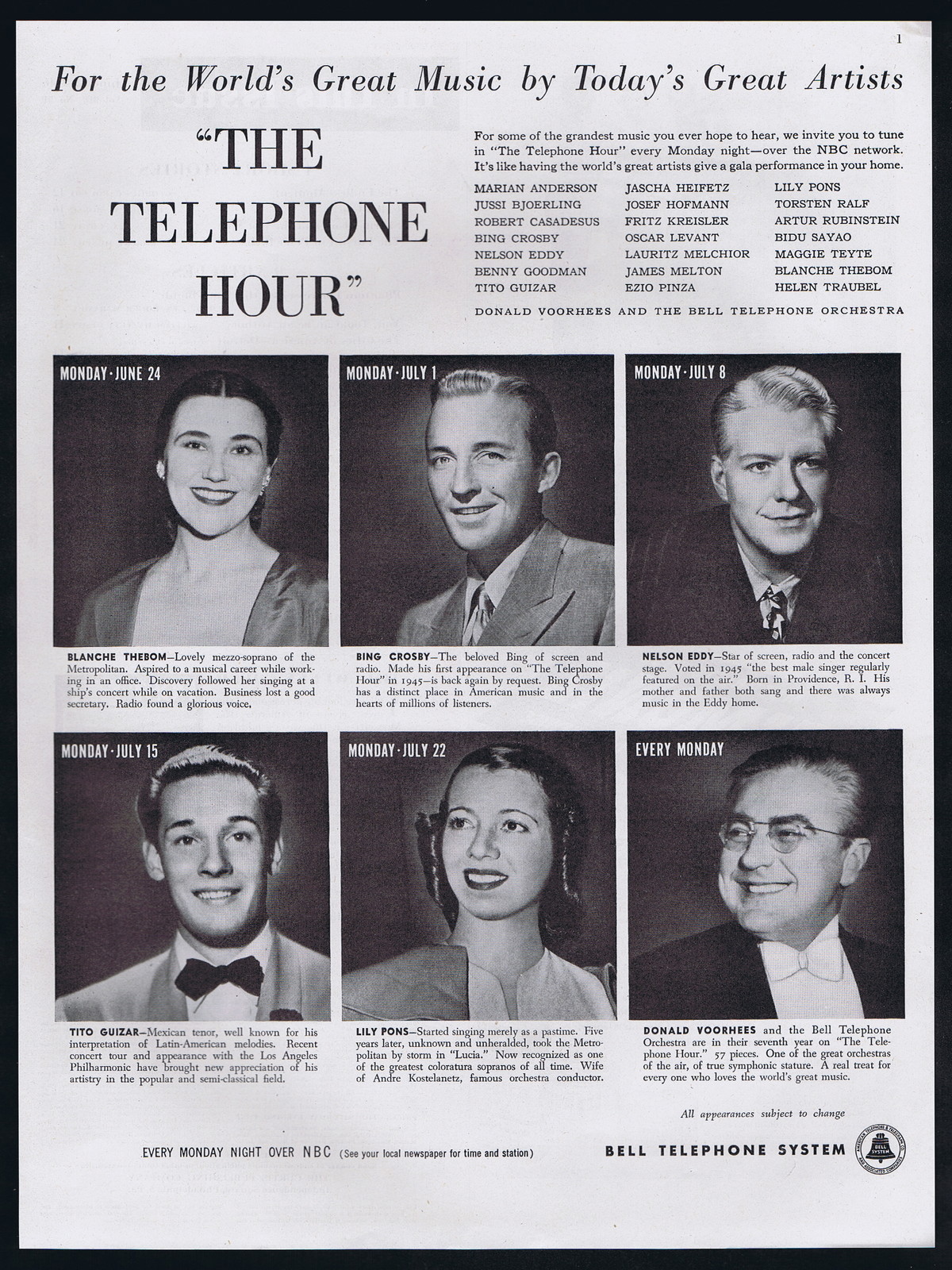
BD: Who were some of your Isoldes?
BT: Oh I sang with Flagstad, Traubel, Varnay . . .
BD: Would you compare those three magnificent voices?
BT: [Thinks for a moment] There absolutely is no comparison. They were three totally different voices. People try to compare Flagstad with Nilsson. I think that Flagstad was the ideal total composite of all the things that were wonderful in Traubel and the enormous dramatic intensity of Varnay. In addition to that, she had one wonderful, mystical thing that I have never heard in any other voice that produced a real dramatic Wagnerian sound, and that was femininity. She was such a woman as a Wagnerian heroine. I did the recording with her and Furtwängler, and I was so happy when I heard the first playback because in the very first phrase she sings is the most beautiful, warm, compassionate, loving, feminine sound that you are every going to hear, and that was just exactly the way she did it on stage. Although by this time she certainly was not young, she had tremendous dramatic intensity in her visual aspect, much more than was the case with Traubel. Flagstad had incredible vocal control. There was absolutely nothing that she could not do. She had ravishing crescendos and decrescendos, and those incredible forte attacks. When you stood right next to her you could feel them. Helen Traubel was warm and wonderful to me and was so helpful and supportive. I loved her dearly, but her characterization did not have the kind of depth of antiquity behind it somehow. She was a much more accessible surface kind of Isolde. You could anticipate what she would to. She was more of a today's kind of woman.
BD: Was she more superficial?
BT: Not superficial, but predictable. Flagstad had a way of turning a phrase and suddenly you were back in the tenth century. It was a totally different style and I simply can't articulate it any better than this. Varnay is a fantastic performing intelligence. She not only delves for background, but goes for it with a pick and shovel. She is going to have everything at her finger tips and is enormously emotional with her involvement with it, but it is still overall an emotional direction. Maybe that is the difference — Varnay used things because of intellectual command, whereas with Flagstad it was as if all these things had been put into a computer centuries ago, and when it was needed it was there without her sending any kind of command at all.
BD: What about some of the others of that generation — Harshaw for instance?
BT: I think that her career would have been a much longer one if she had not tried to become a soprano and rather had remained a mezzo. She was a magnificent Brangäne and vocally a beautiful singer. We are very good friends, and as I sat judging last evening I can tell her students because they are just wonderful. Nowadays we get together and have good times, which was not the case when we were singing.
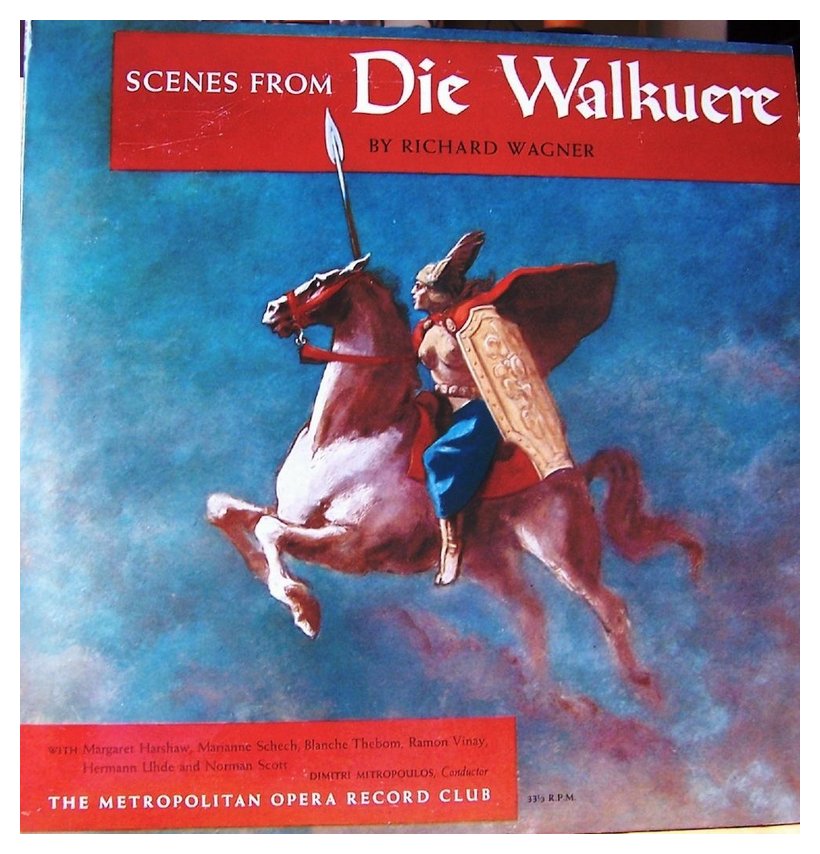
BD: Was there a rivalry between you?
BT: Unfortunately there was. She was very unhappy when I came in because she had been doing the roles which I did when I was there. She told me that she really had become a soprano because of me. She was not bitter about it, in fact she said she had me to thank for the soprano roles she sang. But that is another thing that I feel singers must be told when they start out — to be able to see the light shining at the end of the career. It happens to us all and we must find our ways to handle our careers and our lives in such a way that when it is time for an exit, it can be a gracious one. We are not immortal.
BD: We are so very grateful that ones such as you and Margaret Harshaw and Italo Tajo have become teachers who take the trouble to teach and show us the way.
BT: Thank you. It is not "to take the trouble," but rather to pass along what we have and had, which we could not have had ourselves. It was passed along to us.
BD: So each singer keeps it in trust to use and then pass along to the next?
BT: That is exactly my feeling, yes. To the extent that we can be immortal, it is those certain pieces of knowledge and culture and experience that we are able to pass from one to the other. That is the only thing that's really important that continues to live. My teacher, Edyth Walker, was a student of a teacher who had been a prize student of Pauline Viardot-Garcia.
BD: So there is a direct line!
BT: The heritage goes right back and one is terribly conscious of that. So that's part of the obligation, to pass it along to the next.
BD: Are there any who spring onto the stage with glorious voices but do not have this heritage behind them?
BT: Yes, that does happen, but those are the ones with whom you feel there is a certain lack. There are the wonderful sounds, but the thing that I hear so frequently from opera lovers who are familiar with the work of a few decades past is the lack of style. That's the intangible sort of thing.
BD: Is that the difference between being a singer and being an artist?
BT: Yes. A singer and a stylist. The complete artist is the one who encompasses not only a glorious voice, but also a great sense of style and a sense of ones own security within the their own knowledge. That is what tradition is all about.
* * * * *
BD: Do you find more depth in the works of Wagner than in the works of other composers?
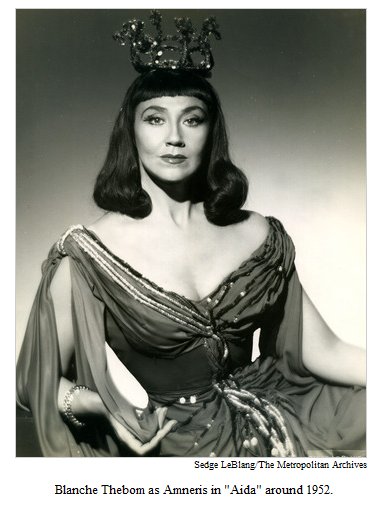 BT: Yes, I think so. It depends on how you approach things. Some of the greatest personal involvement that I have ever undergone — research and thinking and listening and trying to hang it all together — was with Gluck's Orfeo, which is basically a very simple score. So it's not the complexity of the music. There's a lot of contemporary music that if you can just manage to make the intervals and hit the right notes and do them in time, that's really all you have to do. The structure is almost total without you. In Wagner, the fact that he was his own librettist makes the words incredibly important. I quote Wagner's music in very early session in classes for students who are trying to learn how to go about studying. Most people don't know how to study; they don't know what they're looking for or how to begin. It comes as a thundering surprise that every opera and every song started as a text that created the mood, that created the story that fascinated the composer. The music that comes to a gifted composer, then, is a just a setting of the words. That's all it is. The emotional impacts are engendered through the words and dramatic situations that are built as a result of that. Because Wagner wrote his own texts, there is more closeness with his music. You find alliterations in the things that he does that fit exactly the music that must have been going through his head as the words came to him. One exercise I have students do is to take the vocal line out — have an accompanist or if they can do it themselves — and simply concentrate on what there is in the musical structure. The opera singer is guilty many too many times of not knowing what is happening in there. Each singer should know not only what he or she is singing but what's going on around in the music. We are the tip of the iceberg, and so much of what one needs to know for interpretation is reflected in how the composer has set the music. You need to know what the lines mean, or what the composer meant when he sat with his text and mentally saw his stage. You don't need "wing" it or be confused about what the composer meant because it is all there if the singers would take the trouble to dig it out and see how their line fits into the whole. It's the person who only knows his own lines who will be dead during other passages. They simply don't feel themselves as a part of the whole fabric — if they even know what the fabric is. As far as Wagner is specifically concerned, I don't feel there is ever a time or a person who can ever say that he or she knows everything that is there. If I were to sing a performance of Brangäne tomorrow night, I'm sure that in studying it again between now and then I'd find things on the first two pages that I never saw before. It's just limitless.
BT: Yes, I think so. It depends on how you approach things. Some of the greatest personal involvement that I have ever undergone — research and thinking and listening and trying to hang it all together — was with Gluck's Orfeo, which is basically a very simple score. So it's not the complexity of the music. There's a lot of contemporary music that if you can just manage to make the intervals and hit the right notes and do them in time, that's really all you have to do. The structure is almost total without you. In Wagner, the fact that he was his own librettist makes the words incredibly important. I quote Wagner's music in very early session in classes for students who are trying to learn how to go about studying. Most people don't know how to study; they don't know what they're looking for or how to begin. It comes as a thundering surprise that every opera and every song started as a text that created the mood, that created the story that fascinated the composer. The music that comes to a gifted composer, then, is a just a setting of the words. That's all it is. The emotional impacts are engendered through the words and dramatic situations that are built as a result of that. Because Wagner wrote his own texts, there is more closeness with his music. You find alliterations in the things that he does that fit exactly the music that must have been going through his head as the words came to him. One exercise I have students do is to take the vocal line out — have an accompanist or if they can do it themselves — and simply concentrate on what there is in the musical structure. The opera singer is guilty many too many times of not knowing what is happening in there. Each singer should know not only what he or she is singing but what's going on around in the music. We are the tip of the iceberg, and so much of what one needs to know for interpretation is reflected in how the composer has set the music. You need to know what the lines mean, or what the composer meant when he sat with his text and mentally saw his stage. You don't need "wing" it or be confused about what the composer meant because it is all there if the singers would take the trouble to dig it out and see how their line fits into the whole. It's the person who only knows his own lines who will be dead during other passages. They simply don't feel themselves as a part of the whole fabric — if they even know what the fabric is. As far as Wagner is specifically concerned, I don't feel there is ever a time or a person who can ever say that he or she knows everything that is there. If I were to sing a performance of Brangäne tomorrow night, I'm sure that in studying it again between now and then I'd find things on the first two pages that I never saw before. It's just limitless.
BD: You've mentioned that the words are wedded to the music. Does Wagner work in translation?
BT: You need a translator who is completely comfortable and feels both languages, not someone who uses one and is just conversant in the other. But if he is comfortable in both and has emotional responses in both and is a great enough writer to be able to do it justice, then there is no reason it shouldn't work.
BD: Have you heard the Portertranslations?
BT: No, I have not. Wagner made very few musical mistakes as far as the declamation of the music is concerned. I can never understand people who say that they're not going to touch Wagner anyway until the end of their career because I find that Wagner has a much more logical vocal line than even with Verdi who is supposed to be the superb writer for the human voice. With only a couple of minor exceptions that I can think of, Wagner handled every voice perfectly, and they must have been by choice since he didn't do anything by accident. In other words, the baritone character is handled perfectly for a baritone, and it's the same for the Isolde voice and the Brangäne voice.
BD: Then is it wrong now that some basses are singing Wotan and Hans Sachs?
BT: I have a feeling that we shouldn't be so categorized. The Germans have a big thing about their fach, but I tend to agree with the period of the super-singers such as Lilli Lehmann and Pauline Viardot-Garcia, where they sang what they could sing — like Hornedoes today. This was one of the things that Walker told me — not to limit myself because if I don't, no one else can. That's one of the best pieces of advice anyone can give. It may get you in a bit of trouble along the way, but you will not lead a dull life! The categories are not as important as asking whether or not it fits your style and where you function most effectively. If we can do it, the audience should go with us because they might see something totally new. If I had had the time and the right place, I would have loved to have done Tosca because it is really dramatically and emotionally a mezzo-type role. With the exception of a couple of high Cs, the tessitura is in no way a strain for a dramatic mezzo. But in my day, you really couldn't wander too far from your fach without people becoming critical of your regular performances. I had one experience with that. I did Elizabeth in Tannhäuser in Sweden. I adored that role, and the tessitura is really much more comfortable for a mezzo than Venus, so there was really no reason for me not to sing it. I did it in Stockholm which has a small house with beautiful acoustics and, of necessity for the size of the house, a smaller orchestra. So I did it and absolutely adored doing the part, and I think I did a very good performance. The thing that pleased me was that many people told me afterwords that it was like seeing a totally new version of the opera because there was a different sound and a different type of characterization that was possible for me which was not the traditional. The same would be true of the Tosca. But even though other houses offered me the role, there were rumblings in the business about whether or not I was becoming a soprano, or if I was at the end of my career. So I didn't do any other performances of that or any other soprano roles.
BD: Is it wrong to have one person do both Venus and Elisabeth?
BT: Well, it's a Germanism that a man loves so many women but it's really only one woman and a man's desires are basically always for the same person. It's one of those convoluted kinds of ideas. I see nothing wrong with it, but I don't think it adds anything.
BD: Let's touch on the Ring a bit. You sang Fricka and Waltraute?
BT: I did very few performances of Waltraute, but I adored it and recorded the scene [see 78 rpm disc in photo below] and I'm very pleased with it, but never really had many opportunities to do it and don't really know why. It's a wonderful scene and no matter how long the act is, the public is still waiting for you when you come out at the end. The same with the Walküre Fricka.
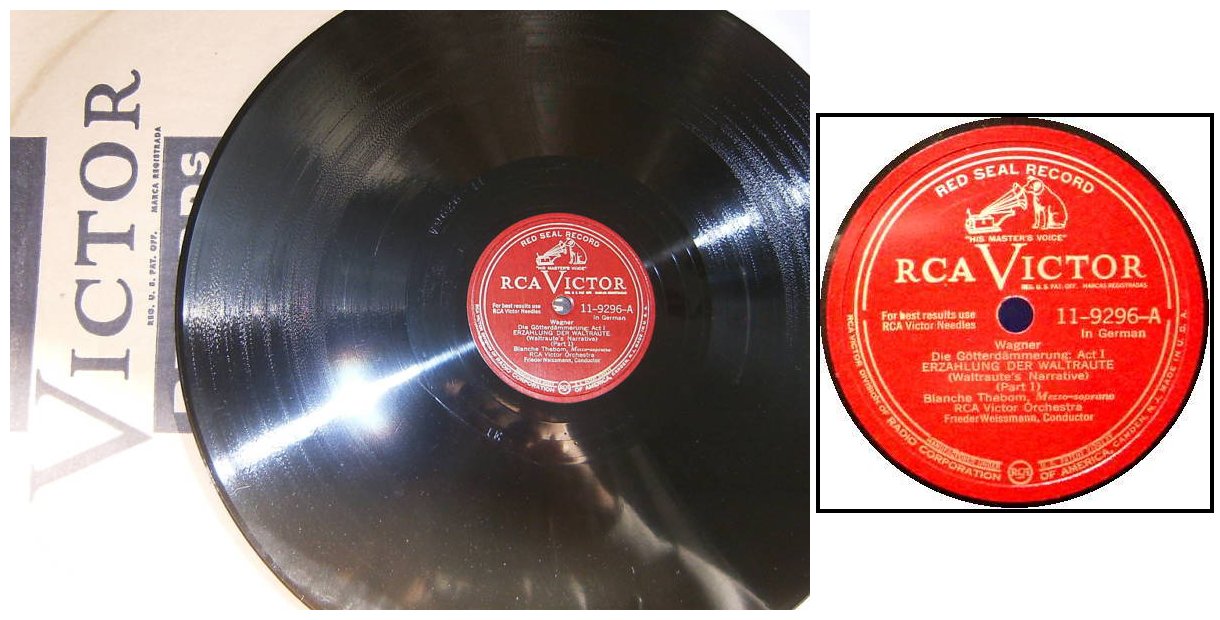
BD: Tell me a bit about Fricka. How powerful is she?
BT: I always loved the character of Fricka. I may have a little of it in my basic nature. I often see things as black or white and can be relentless to a certain degree. She is compassionate with the people who don't feel the same way about it, so I can relate to her. I could not understand the things that I was hearing from some of the German coaches at the opera house when I was preparing it. I had my concept nailed down when I went in for my first rehearsals. They saw her as a nagging fishwife, and I think that totally misses the majesty that I find that Wagner has allocated to her in his music. It is totally unjustified. My delineation of her was never anything but the offended Goddess. She's really no longer a wife to Wotan, and she's very acutely unhappy about that. The way she speaks about the Valkerie maidens and how he wanders through the world and has children with others. She is offended to her core by this whole thing. She is a Goddess. That is her status. That's the thing, she is not a woman, and this is what I find lacking in other performances which I've seen. Others play her as an offended woman and that's not Fricka at all.
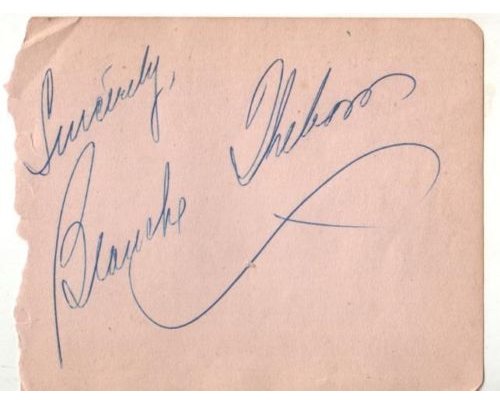 BD: Is Wotan a God or a man?
BD: Is Wotan a God or a man?
BT: Wotan is a God who has deliberately perverted his godhood. His lust and ambition has caused him to lose his godhood, and this is what she accuses him of. She is not railing against his having illegitimate children, but rather she is offended that he goes against everything that Fricka stands for. Her scene is a matter of principle. Her exit music is some of the purist music that Wagner ever wrote. It's not Fricka having shown him a thing or two and going off in a huff. You have to psychoanalyze the music because that's the road map, that's the water in the fishbowl in which you swim during that performance. You live in that and you cannot work counter to that successfully. That's when it can become gimmicky and hokey. When you are dealing with genius, there are not mistakes in there. He has laid it all out for us, just as Verdi has and just as Gluck has. It's all in there, and it is up to each of us to find our way in there so that we begin to think with the composer's thoughts. We can't go in there and superimpose our willful ideas like mustard-plasters on that music. That's just impossible. I've always felt that one submerges oneself in this water in which we then live. We are supported there and we cannot act contrary to that.
BD: That's a wonderful philosophy.
BT: It's the best way to do it because then you don't have to improvise and you don't walk onstage feeling that you're there without support. You are there as a human being, being asked to do supernatural things. Performing an opera is a supernatural thing. It is more than human, really. For one person to stand there and physically, vocally surmount that wall of sound while acting... the whole thing is totally illogical! Maybe I never suffered from the devastating cause of nerves that some of my colleagues suffered from because I don't feel alone onstage. I'm there where I belong, doing what I know how to do and what I feel creative doing. It's a whole wonderful world where nothing can possibly go wrong because it's all pre-planned. It's an entity before you make your first entry. So people who go out there and try to do it alone have my deepest sympathy.
BD: [Noting the time] I feel that we've barely scratched the surface, and I thank you ever so much for taking the time for this chat.
BT: Well I'm delighted to have done so. You know, I'm going to be giving some lectures and will use a few of the remarks you gleaned from James Levine which were published in Wagner News!
BD: [Surprised, but very pleased] That is high praise, indeed! Thank you so very much.
Blanche Thebom, Star at the Met and Beyond, Dies at 94
By MARGALIT FOX
Published: March 27, 2010, The New York Times [Text only - photos from another source]
Blanche Thebom, a mezzo-soprano who was discovered singing in a shipboard lounge as a teenager and went on to sing more than 350 performances with the Metropolitan Opera, died on Tuesday at her home in San Francisco. She was 94.
Her death was confirmed by Roger Greenberg, a longtime friend.
In a field long dominated by Europeans, Ms. Thebom (pronounced THEE-bom, with the th as in thin) was part of the first, midcentury wave of American opera singers to attain international careers. Associated with the Met from the mid-1940s to the mid-1960s, she was praised by critics for her warm voice, attentive phrasing and sensitive acting.
Ms. Thebom was best known for Wagner. She made her Metropolitan Opera debut in Philadelphia in November 1944 as Brangäne in an out-of-town production of “Tristan und Isolde”; the next month she appeared with the company in New York, singing Fricka in “Die Walküre.”
Reviewing her “Walküre,” a critic for The New York Times wrote that Ms. Thebom “scored an immediate success.”
At the Met, her other roles included Ortrud in Wagner’s “Lohengrin,” Azucena in Verdi’s “Trovatore” and Amneris in his “Aïda,” and the title role in Bizet’s “Carmen.” She also sang at Covent Garden and the Glyndebourne festival in England.
In 1957, presented by the impresario Sol Hurok, Ms. Thebom made a three-week tour of the Soviet Union. (There, as The Times wrote afterward, “the singer was surprised to find that her mink coat was a traffic stopper wherever she went.”) Her engagements included a Carmen with the Bolshoi Opera in Moscow.
Ms. Thebom last performed at the Met in 1967. She later directed the opera program at the University of Arkansas, Little Rock, and afterward moved to San Francisco, where she taught privately and helped create a training program for young singers.
In later years, Ms. Thebom appeared often in duo recitals with the soprano Eleanor Steber.
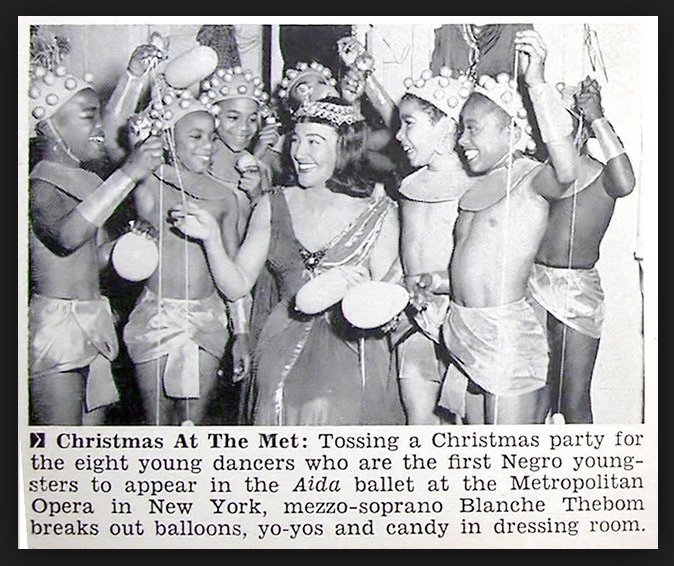
Blanche Thebom was born on Sept. 19, 1915, in Monessen, Pa., and reared in Canton, Ohio; the year of her birth is often given erroneously as 1918. Her parents immigrated from Sweden. As a girl, she sang in a church choir.
While still a teenager, Ms. Thebom traveled to Sweden with her parents in the 1930s. On the crossing, she was heard singing in the ship’s lounge by Kosti Vehanen, a pianist who often accompanied the contralto Marian Anderson. Mr. Vehanen arranged for Blanche to study in New York, where her primary teacher was Edyth Walker, a former Metropolitan Opera mezzo.
Ms. Thebom’s marriage, to Richard Metz, ended in divorce. No immediate family members survive.
Her recordings include Mozart’s “Così Fan Tutte,” in which she sings Dorabella [shown below], on the Sony Classical label, and albums of songs by Hugo Wolf and Robert Schumann [also shown below] for RCA Victor. She appeared in films, among them “Irish Eyes Are Smiling” (1944) and “The Great Caruso” (1951).
[The recording shown above is sung in English. The one seen below is in the original Italian.]
Ms. Thebom’s career seemed ordained from the moment she stepped onto the New York stage. Making her recital debut at Town Hall in January 1944, she sang a program of Massenet, Handel, Mussorgsky and Brahms.
Reviewing the concert, The Times called her a “richly gifted young artist,” adding, “Her work revealed a wealth of temperament and an inherent musicianship that presage a brilliant career.”

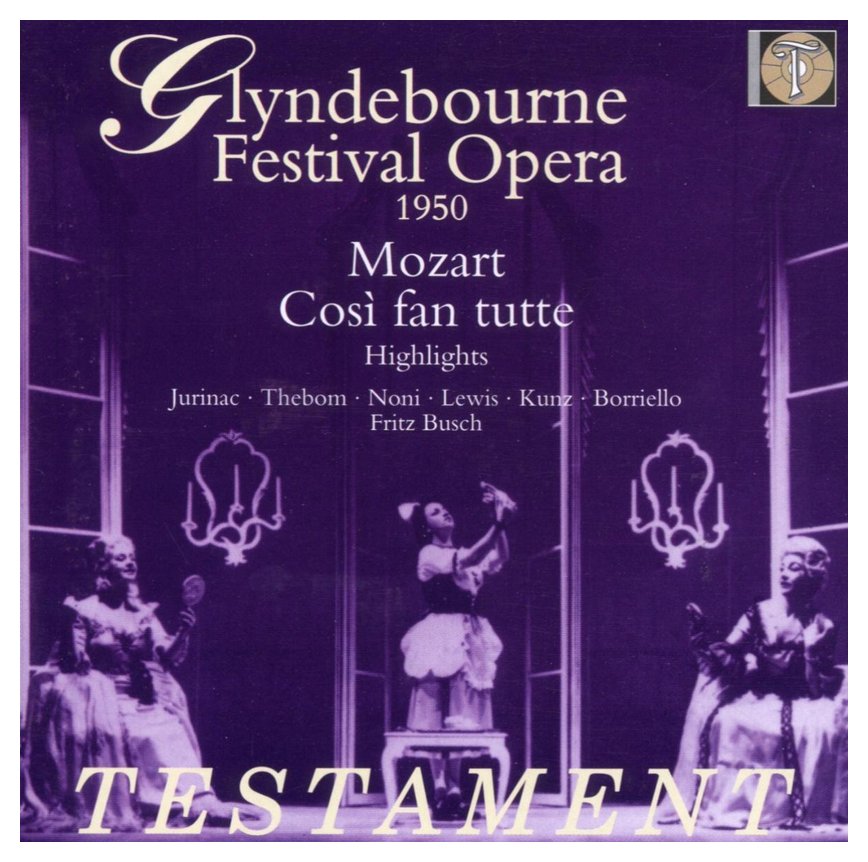
[The following is from a review in Gramophone Magazine (June, 1994) by Alan Blyth]
These highlights, which I refer to in my Glyndebourne collection (see page 38), have often been held up as a model of how the piece should be performed, and countless have been the laments that EMI did not throw caution to the winds and record the work complete. At least they preserve the better part of Jurinac's sovereign Fiordiligi, not recorded elsewhere, thus making it a 'must' for the many lovers of her singing. Here her voice was youthfully fresh, although not quite as full and rounded as it was to become. The ease and warmth of delivery, the natural quality of tone were prized by all who heard her in the part, an apt concomitant to her beguiling presence. Hers isn't quite the commanding Fiordiligi of her predecessor and successor in the role—Souez and Vaness—in Glyndebourne recordings on disc, but a more vulnerable and lovable creature. She is aptly partnered in the duets by the lively though not particularly individual Dorabella of Thebom and the mellifluous Ferrando of Richard Lewis, then at the beginning of a 24-year stint in the house. Erich Kunz was an engaging and mellow-voiced Guglielmo—what a pity his arias weren't included at the sessions—who contributes positively to the perfect ensemble of the two quintets and sings seductively to Thebom's Dorabella in ''Il core vi dono''. Boriello brings an Italianate tang to Alfonso's contributions. For some reason the producer David Bicknell took a dislike to Noni's equally Italianate Despina, so her arias were at the time excluded. However, a few months later he had relented and she recorded both for HMV (DA1986, 7/51—nla) but not with Busch conducting. These are included here in the right order. Busch's interpretation differs little from that on his 1935 set (Pearl, 3/91) and remains a model of how to marry incisive and vital accents with the yielding phrase. The RPO, with Brain playing the horn obbligato in ''Per pieta'', perform ingratiatingly. The recording, made on early tape, has some print-through, but on the new transfer it is seldom bothersome. Testament have come up with some additional material: rehearsal takes for ''Prendero quel brunettino'', ''Per pieta'' (during which, at one point Jurinac breaks down, and, endearingly, curses herself) and ''Fra gli amplessi'', the last marginally freer than the published performance. Busch can be heard a couple of times encouraging his players. Now we must have the roughly contemporaneous extracts from Idomeneo.
© 1982 Bruce Duffie
This interview was recorded at her apartment in Chicago on October 19, 1982. Segments were used (with recordings) on WNIB in 1986 and 1993. The transcription was made and published in Wagner News in August, 1983. It was re-editied and posted on this website in 2013.
To see a full list (with links) of interviews which have been transcribed and posted on this website, click here.
Award- winning broadcaster Bruce Duffie was with WNIB, Classical 97 in Chicago from 1975 until its final moment as a classical station in February of 2001. His interviews have also appeared in various magazines and journals since 1980, and he now continues his broadcast series on WNUR-FM, as well as on Contemporary Classical Internet Radio.
You are invited to visit his websitefor more information about his work, including selected transcripts of other interviews, plus a full list of his guests. He would also like to call your attention to the photos and information about his grandfather, who was a pioneer in the automotive field more than a century ago. You may also send him E-Mailwith comments, questions and suggestions.
